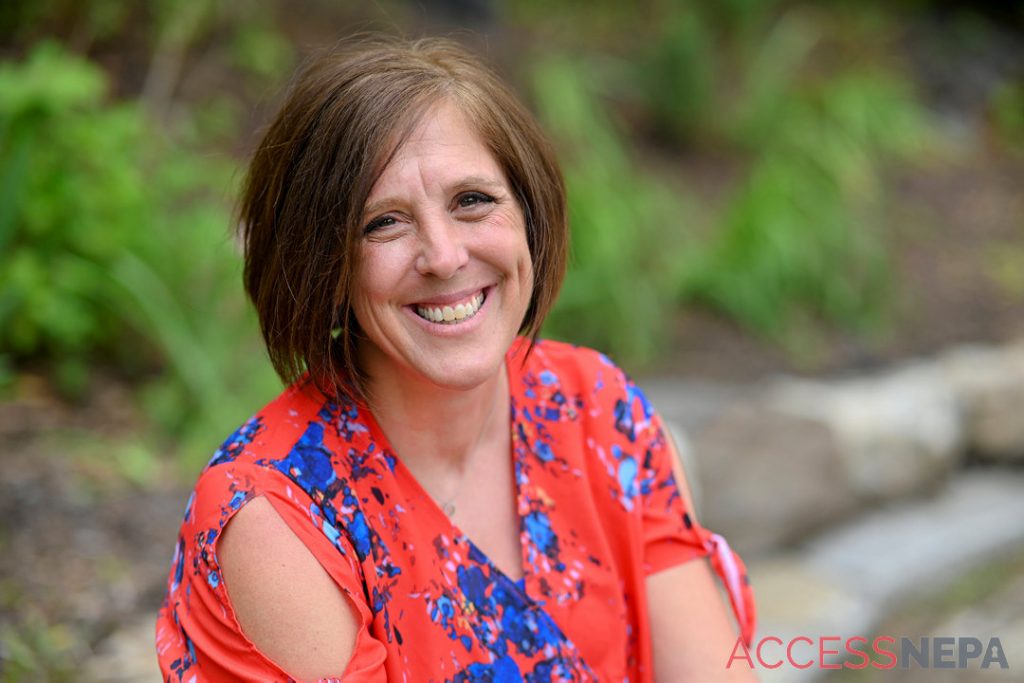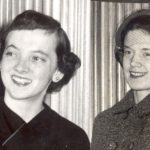Renee Jourdanais guides the next generation of helpers with her experienced hand.
The upstate New York native has spent more than two decades sharing her knowledge of the speech-language pathology world with students at her alma mater, Marywood University. As assistant professor of practice and clinic director, Jourdanais provides undergraduate and graduate students with the knowledge they need to succeed in the field and helps them hone their skills at the on-campus clinic.
“This is a career that offers so many opportunities,” Jourdanais said on a recent morning at her office in the campus’ McGowan Center for Graduate and Professional Studies. “There’s not just one avenue. … There’s always people who need help. The employment opportunities are huge, and it’s just what you make of it.”
Jourdanais originally intended to study art in college but changed her mind after someone she knew had a stroke. Speech-language pathologists often help people who have had strokes and other brain injuries as well as conditions such as cleft palates and developmental delays. Jourdanais went on to earn a bachelor’s degree in communication sciences and disorders from Marywood and a master’s degree in speech-language pathology from Nazareth College in Rochester, New York. She worked for a few years at Allied Services in Scranton before moving to Marywood in 2000.
Today, Jourdanais, who lives in Pleasant Mount, teaches students in the university’s five-year program, through which they earn a bachelor’s degree in communication
sciences and disorders and a master’s degree in speech-language pathology. She teaches clinically based courses and helps prepare undergraduates for their first experience in the clinic, which offers help in audiology and speech-language pathology. During her own time as a Marywood student, Jourdanais saw firsthand the importance of having a strong mentor. She said now-retired professor Dr. Janet Bisset’s interactions with others and the joy she found in her work made others want to emulate her.
“She was just such a kind and motivating factor as an undergraduate here,” Jourdanais said.
She feels grateful for the time she spent at Allied, too, which gave her experience in a variety of areas in both in-patient and outpatient settings that she now passes on to her students.
“The varied experience just helps the students,” Jourdanais said. “We all sort of had our niche of what we did.”
The clinic, meanwhile, treats clients as young as 3 and as old as 90 for free and is so in-demand that it has a waiting list of potential patients. Jourdanais said she feels terrible that the wait list is sometimes more than they can handle, but she enjoys helping people in need, especially during this last challenging year.
Because of the coronavirus pandemic, students and faculty faced unique challenges, as they had to stop services during the spring 2020 semester.
“We had to sort of pivot and think about clinical education online,” Jourdanais said.
Unable to see clients in person, students were allowed to use teletherapy to continue their education and gain experience before eventually moving back into the clinic as restrictions eased up. As stressful as it was, Jourdanais found a silver lining.
“The good outcome of that … is that our students got a really cool experience (with teletherapy),” she said. “It’s a feather in their cap to be good at teletherapy. There was the good and the bad.”
Jourdanais praised her coworkers, too, noting that the clinical faculty at Marywood are all products of the university in some way and that they “would not be anywhere without everyone.” They strive to make sure their students get all the experience they need to prepare them to move on their careers.
“It’s a good feeling knowing that who’s going to go out and get that first job is a good representative of Marywood,” she said.
There’s a unique joy in the work that they provide, too. The first time a client experiences a breakthrough can make you feel “like a million bucks” and reassure you that you chose the right career, Journdanais said.
“It’s nice to see the progress or the ‘a-ha’ moments,” she said.
A former softball player for Marywood, Jourdanais also plays a significant role with the university’s sports, too. As faculty athletic representative, Jourdanais serves as the liaison between the university and its athletics department and represents the university at conferences and other NCAA activities. Every school must have a FAR, who advocates “for student-athletes in all aspects of their collegiate experience,” according to the NCAA.
“Athletics has always been a part of my (life) growing up, and it’s nice to be part of it here,” Jourdanais said.
Jourdanais has used her love of athletics to help others, too, participating in bicycle rides for multiple sclerosis awareness in honor of an inspirational client who has the disease. She has completed the “city to shore” rides, which take her from the Philadelphia area to the Jersey coast, for several years.
Other clients continue to inspire her, too, and knowing she can play a small part in helping someone overcome issues “makes you love your career and (feel) happy with your decision every day to do it again,” Jourdanais said.
“There are people that you meet along the way that make you remember day in and day out how resilient individuals are,” she said.

Caitlin Heaney West is the content editor for Access NEPA and oversees the Early Access blog in addition to working as a copy editor and staff writer for The Times-Tribune. An award-winning journalist, she is a summa cum laude graduate of Shippensburg University and also earned a master’s degree from Marywood University. Caitlin joined the Times-Shamrock family in 2009 and lives in Scranton. Contact: cwest@timesshamrock.com; 570-348-9100 x5107; or @cheaneywest




